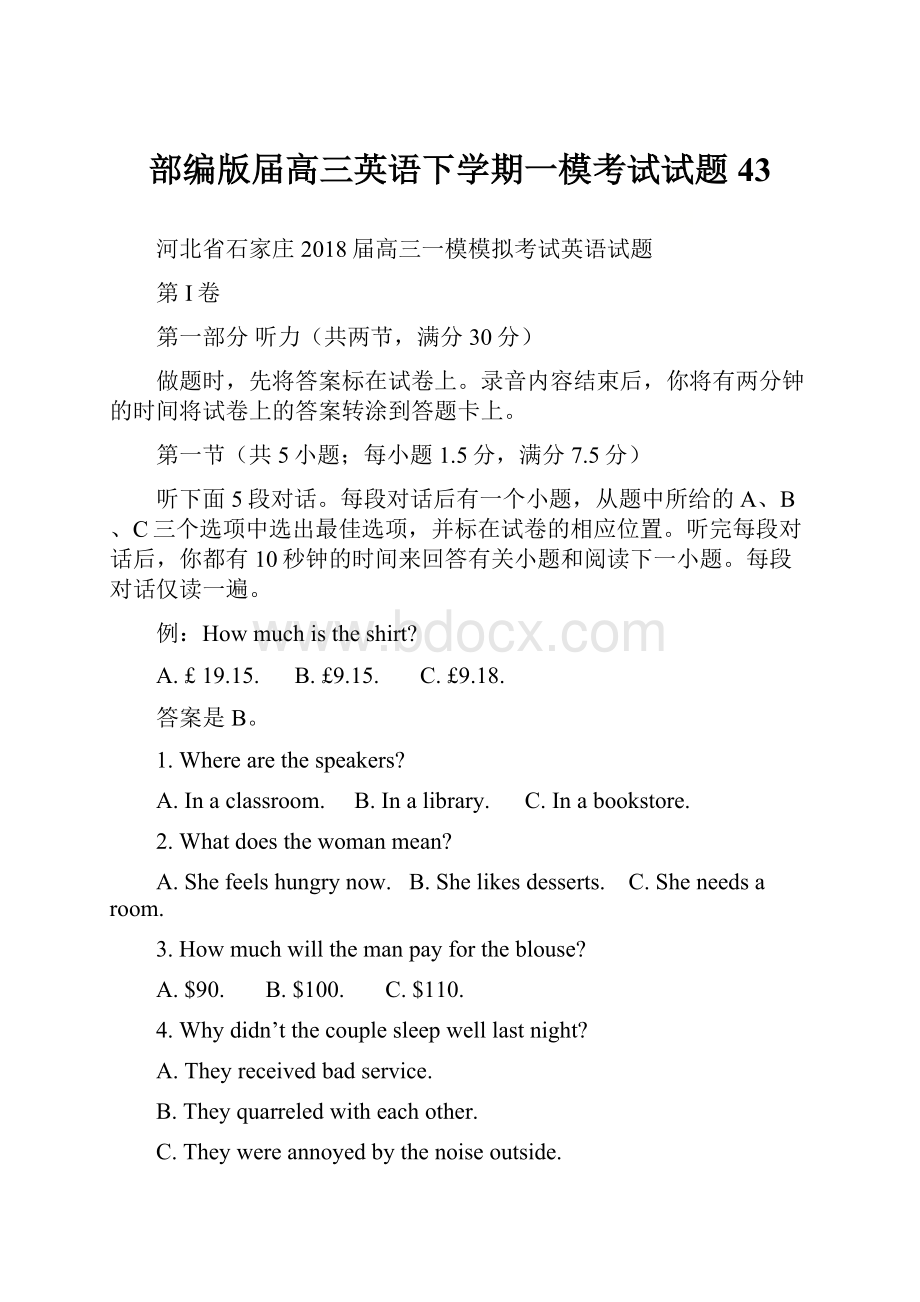部编版届高三英语下学期一模考试试题43.docx
《部编版届高三英语下学期一模考试试题43.docx》由会员分享,可在线阅读,更多相关《部编版届高三英语下学期一模考试试题43.docx(15页珍藏版)》请在冰豆网上搜索。

部编版届高三英语下学期一模考试试题43
河北省石家庄2018届高三一模模拟考试英语试题
第I卷
第一部分听力(共两节,满分30分)
做题时,先将答案标在试卷上。
录音内容结束后,你将有两分钟的时间将试卷上的答案转涂到答题卡上。
第一节(共5小题;每小题1.5分,满分7.5分)
听下面5段对话。
每段对话后有一个小题,从题中所给的A、B、C三个选项中选出最佳选项,并标在试卷的相应位置。
听完每段对话后,你都有10秒钟的时间来回答有关小题和阅读下一小题。
每段对话仅读一遍。
例:
Howmuchistheshirt?
A.£19.15.B.£9.15.C.£9.18.
答案是B。
1.Wherearethespeakers?
A.Inaclassroom.B.Inalibrary.C.Inabookstore.
2.Whatdoesthewomanmean?
A.Shefeelshungrynow.B.Shelikesdesserts.C.Sheneedsaroom.
3.Howmuchwillthemanpayfortheblouse?
A.$90.B.$100.C.$110.
4.Whydidn’tthecouplesleepwelllastnight?
A.Theyreceivedbadservice.
B.Theyquarreledwitheachother.
C.Theywereannoyedbythenoiseoutside.
5.Whatarethespeakerstalkingabout?
A.Dealingwithinsects.B.Buyinganewhouse.C.Sellingakindofdrug.
第二节(共15小题;每小题1.5分,满分22.5分)
请听下面5段对话或独白。
每段对话或独白后有几个小题,从题中所给的A、B、C三个选项中选出最佳选项,并标在试卷的相应位置。
听每段对话或独白前,你将有时间阅读各个小题。
每小题5秒钟;听完后,各小题将给出5秒钟的作答时间。
每段对话或独白读两遍。
听第6段材料,回答第6至7题。
6.Whatisthemangoingtodo?
A.LookforhisIDcard.B.Checkhisbaggage.C.Getofftheflight.
7.Whydoesthemanhavetopay90yuan?
A.Heisoverweight.
B.Hewantstobuyabag.
C.Hisbaggageisoverthelimit.
听第7段材料,回答第8至9题。
8.Whatistheprobablerelationshipbetweenthespeakers?
A.Couple.B.Classmates.C.Colleagues.
9.Whatdoesthemanplantodointhenewyear?
A.Takemoreexercise.B.Learnhistory.C.Learnchemistry.
听第8段材料,回答第10至12题。
10.Whydoesthemanmakethecall?
A.Tovisitthewoman.
B.Toaskaboutservice.
C.Toconfirmanappointment.
11.Whatisthewomangoingtodoatnineo’clock?
A.Meetherfriend.B.Seeherdoctor.C.Gotowork.
12.WhenwillthewomanseeDr.Parker?
A.At9a.m..B.At1:
15p.m..C.At1:
50p.m..
听第9段材料,回答第13至16题。
13.Whatgivesapolicemanasenseofdutyinthewoman’seyes?
A.Asuit.B.Atie.C.Auniform.
14.Howdoesthewomanfeelwheninanicesuit?
A.Morepowerful.B.Moreconfident.C.Smarter.
15.Whydoesthemanwearatie?
A.Tomakehisbrainworkbetter.
B.Tohelphimlookinteresting.
C.Toremindhimtobeanactor.
16.Whatistheman?
A.Ajudge.B.Alawyer.C.Abusinessman.
听第10段独白,回答第17至20题。
17.Whereisthebusgoing?
A.Tothebeach.B.Tothehotel.C.Tothecity.
18.Whatcanthepassengersdointhebus?
A.Takepictures.B.Drinksomething.C.Eatsomefood.
19.WhyarethepassengersforbiddentoswiminLosCabos?
A.Thewaterispolluted.
B.Sharksarefoundthere.
C.Therearestrongwaves.
20.Whatisthespeakerdoing?
A.Announcingtourinstructions.
B.Deliveringaminilecture.
C.Hostingaradioprogram.
第二部分阅读理解(共两节,满分40分)
第一节(共15小题;每小题2分,满分30分)
阅读下列短文,从每题所给的四个选项(A、B、C和D)中,选出最佳选项,并在答题卡上将该项涂黑。
A
Amsterdamisaspecialcity.Therearemanyplacesyoushouldnotmissduringyourvisit.Hereisourlistofthebest.
Amsterdamcanalring
Thecityoldcentreisformedfromcanalrings,whichgiveyouthefeelingofspace,freedomandpeace.Walkthroughthesecanalstreetsorbetter—takeatripbyrentingaboatyourself.AnotherwaytoexploretheVeniceoftheNorthistotakearideonabicycle.Anywayyoudecidefor-enjoythiscity.
TheNationalMaritimeMuseum
TheMaritimeMuseumisanattractiveplacetovisit,especiallywithchildren.Withmanyattractionsinit,thiscolourfulandenjoyablemuseumwillhelpyouunderstandthehistoryoftheNetherlands-asmallnationwhichwasoneoftheworld’sgreatestseapowers.
AmsterdamBrownCafe
WhenyouenterAmsterdamoldcafescalledBrown,atfirstitwillseemtoomuchfromthepastandtoocrowded,buttheatmosphereisunique.Relaxandwatch-mostofpeoplearoundwillbelocals.Feellikeoneofthem—therealAmsterdammers.
CivicGuardsGallery
ThisgalleryisfilledwitholdpaintingsfromtheDutchGoldenAge.Theexhibitedcanvasmaybenotalwaysthemasterpiecesofart,butthesegroupportraitsofAmsterdamcitizensandtheirwivesareanexquisite(精致的)documentoftheDutchcivilizationandculturecenturiesago.
ToavoidwaitinglinesweadviseyoutobuyyourticketsinadvanceonlinethroughourAmsterdamattractionsandmuseumsticketswebpage.
21.Howmanywaysaretherefortouriststovisitthecityoldcentre?
A.2.B.3.C.4.D.5.
22.Wherewouldyougotolearnmoreaboutlocallife?
A.Amsterdamcanalring.
B.TheNationalMaritimeMuseum.
C.AmsterdamBrownCafe.
D.CivicGuardsGallery.
23.Wheredoesthepassageprobablycomefrom?
A.Afiction.B.Atravelguide.
C.Atextbook.D.Asciencemagazine.
B
Quietlysittingtherereading,Ifoundmyselfsuddenlylisteningtothetrainguard’sannouncements.Traintravelerswillsurelyagreethatwhentheguardmakesanannouncement,whetherit’stherecordedmessageortheguard’smessage,fewpeoplelistentoit,becauseit’softenquitedullorhardtounderstand.Thisonewasdifferent.Inoticedthatotherpassengersappearedtobelistening,too.Notonlythat,everyonewassmiling!
Whywassomuchattentionbeingpaidtothismessage?
AsbestIcanrecall,theguardsaidsomethingalongtheselines,“GoodMorningLadies,GentlemenandChildren,thisisthe7:
35a.m.fromPenrithtoCentralandyou’llbepleasedtoknowthatwearerightontime.AndwhatalovelymorningitisinSydneytoday.Thesunisshining,birdsaresinging,andall’srightwiththeworld.Itrustyouhaveagreatdaywhereveryou’regoing.ThanksforcatchingmytrainthismorningandIhopetoseeyouagainsoon.”
Quiteafewpeople(obviouslypreviousstrangers)startedtalkingtooneanotherabouttheguard’sexcellentmessageandhowgoodithadmadeeveryonefeel.Istartedthinkingaboutthis,andthenIfoundtheyoungguardandsaid“Wereyoutheguardonthe7:
35a.m.fromPenrith?
”Theguardseemedabitstunnedatfirst,replying,“Yes,yyyyes.”“Well,Ireallyappreciateyourannouncement.Thankyouforyourextremelygoodmessage,whichgavemeandtheotherpassengerssuchagoodstarttotheday.Pleasekeepdoingit.”Isaid.
Therearetwomessagesformeinwhathappenedthatday.Firstly,whenpeoplearehappyintheirworkitshowsinwhattheydoandsay.Secondly,thestoryattachesmuchimportancetothebenefitsthataccumulatefromthankingpeopleforsomethingthey’vedone,particularlywhenit’snotexpected.Canyouimaginetheconversationthatguardwouldhavewhenhegothome?
24.Whydofewtraintravelerslistentotheannouncements?
A.Themessagesareunattractive.
B.Theguard’svoiceisnotclear.
C.Theyusuallyfeelsleepy.
D.Theyareabsorbedinbooks.
25.Whatdoestheunderlinedword“stunned”inParagraph3mean?
A.Patient.B.Cautious.C.Surprised.D.Excited.
26.Whatmighttheguardtalkaboutwithhisfamilywhenhegothome?
A.Thebeautifulweather.
B.Therecordedmessage.
C.ThetrainfromPenrith.
D.Theunexpectedappreciation.
27.Whichofthefollowingcanbethebesttitleforthetext?
A.AnIntelligentGuard.B.ABoringTrainStory.
C.ADifferentTrainAnnouncement.D.ALovelyMorninginSydney.
C
It’s3o’clockandyou’vebeenhardatwork.Asyousitatyourdesk,astrongdesireforchocolateovercomesyou.Youtrytobusyyourselftomakeitgoaway.Butitdoesn’t.Hereisanothersituation.Perhapsyouarenotfeelingwell.Theonlythingyouwanttoeatisabigbowlofchickensoup,likeyourmomusedtomakewhenyouweresickasachild.Foodcravingsareastrongdesireforaspecifictypeoffood.Andtheyarenormal.
ScientistsatthewebsiteHowStuffWorkscomparehungerandcravingsthisway.Hungerisafairlysimpleconnectionbetweenthestomachandthebrain.Theyevencallitsimply“stomachhunger.”Whenourstomachsburnupallofthefoodwehaveeaten,ahormone(荷尔蒙)sendsamessagetoonepartofthebrainformorefood,whichregulatesourmostbasicbodyfunctionssuchasthirst,hungerandsleep.Thebrainthenproducesachemicaltostarttheappetiteandyoueat.Hungerisafunctionofsurvival.
Acravingismorecomplex.Itactivates(使活跃)brainareasrelatedtoemotion,memoryandreward.Thesearethesameareasofthebrainactivatedduringdrug-cravingstudies.So,somescientistscallfoodcravings“mindhunger.”Peopleoftencravefoodsthatarehighinfatandsugar.Foodsthatarehighinfatorhighinsugarproducechemicalsinthebrain.Thesechemicalsgiveusfeelingsofpleasure.
Ina2007study,researchersatCambridgeUniversityfoundthat“dietingorrestrictedeatinggenerallyincreasesthepossibilityoffoodcraving.”So,themoreyoudenyyourselfafoodthatyouwant,themoreyoumaycraveit.However,fastingisabitdifferent.Theyfoundthateatingnofoodatallforashortperiodoftimelessenedfoodcravings.
So,thenexttimeyoucravesomethingveryspecific,knowthatyourbrainmaybemoretoblamethanyourstomach.
28.Whatisthefunctionofthefirstparagraph?
A.Toremindreadersoftheirownspecialfood.
B.Todeepentheunderstandingofhunger.
C.Toreportthediscoveryofcravingstudy.
D.Toleadtothetopicofthewholepassage.
29.Whatdowelearnaboutfoodcraving?
A.Itshowsfoodislinkedtofeelings.
B.Itensuresapersonsurviveshunger.
C.Itmeansthestomachfunctionswell.
D.Itprovesthebraindecidesyourappetite.
30.What’sthelikelyresultofdieting?
A.Thedecreaseofchemicals.B.Theincreaseoffooddesire.
C.Therefusaloffatandsugar.D.Thedisappearanceofappetite.
31.Whatdoesthepassagemainlydiscuss?
A.Thefunctionsofbrainareas.B.Whathungerisallabout.
C.Thefindingsoffoodcraving.D.Wh